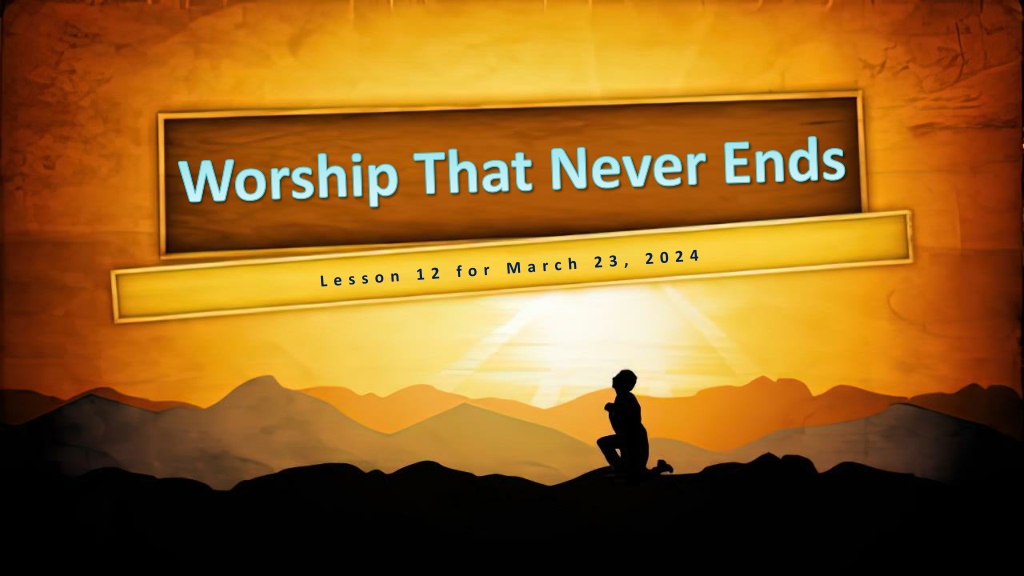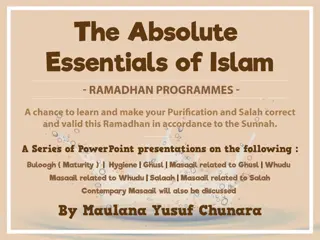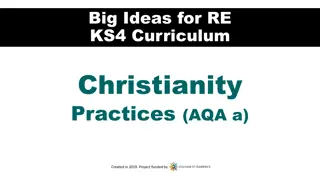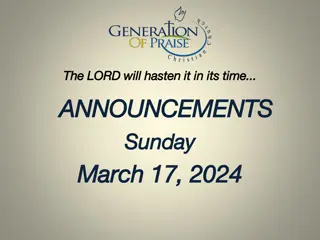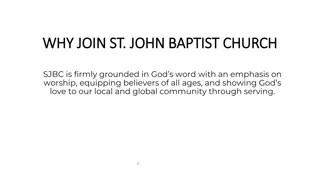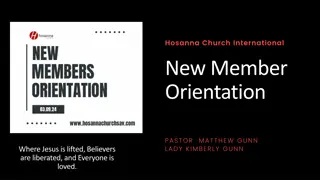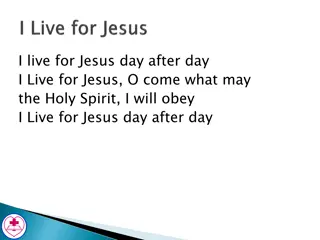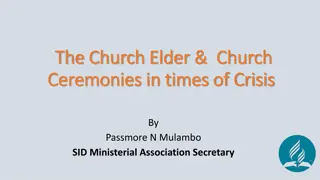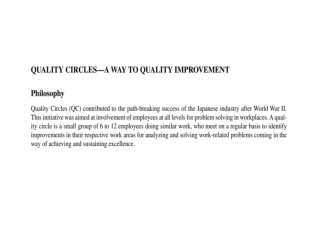Worship That Never Ends
Worship is the heartfelt response to the Creator's gifts, stirring gratitude and adoration in the human heart. From singing praises to ministering in the sanctuary, the act of worship is a sacred expression of love and reverence towards God. Through Psalms and biblical teachings, we learn the essence of true worship and the joy it brings. Discover the beauty of singing a new song, the blessings of adoration in the sanctuary, and the attributes of righteousness that define worthy adoration before God.
Download Presentation

Please find below an Image/Link to download the presentation.
The content on the website is provided AS IS for your information and personal use only. It may not be sold, licensed, or shared on other websites without obtaining consent from the author. Download presentation by click this link. If you encounter any issues during the download, it is possible that the publisher has removed the file from their server.
E N D
Presentation Transcript
I will sing to the Lord as long as I live; I will sing praise to my God while I have my being (Psalm 104:33, NKJV)
Worship is the creature's response to the gifts of the Creator. Two biblical truths are evident in this summary: God has given many blessings to humanity. These blessings should awaken gratitude in the human heart for the greatness of God's love. Human beings are endowed with an innate predisposition to respond to the wonders of God with adoration. Worship must emanate from the heart. The book of Psalms teaches us how we can perform this worship according to what God expects of us.
WORSHIP IN THE SANCTUARY Praise the Lord, all you servants of the Lord who minister by night in the house of the Lord. Lift up your hands in the sanctuary and praise the Lord. May the Lord bless you from Zion, He who is the Maker of heaven and earth. (Psalm 134) The priests raised their hands to bless the people (Num. 6:23-26; Lev. 9:22). But, in this psalm the Levites are invited to raise their hands toward the sanctuary and bless the Lord (Ps. 134:2). In both cases, the result is the same: God responds with blessing (Num. 6:27; Ps. 134:3). Who can bless and praise the Lord? Those who minister in the Sanctuary (Ps. 134:1-2) All who serve the Lord (Ps. 113:1) Since we are all priests called to minister the gospel to the world, we are all called to lift up our hands to the Heavenly Sanctuary, and bless and praise our God (1 Pet. 2:4-5).
Praise the LORD. Sing to the LORD a new song, his praise in the assembly of his faithful people. (Psalm 149:1) What motivates the psalmist to sing a new song? Psalm 149:1-3 Psalm 149:5 Psalm 149:6-9 Psalm 149:4 The joy of knowing his Maker and King. Remember that God is with him, even in illness. Know that God will finally judge all injustices. Know that God saves him. Isaiah invites everyone to also sing a new song (Is. 42:10-12). But what does that song consist of? The new song is the expression of each new experience we live with God: each time we learn something new about his Creation; every time we feel the joy of his presence; every time he comforts us; every time he forgives our sin It is a song that no one else can sing. Only the redeemed will be able to sing that new song in Heaven to the joy and amazement of the angels (Rev. 14:3).
THE ADORATION OF THE RIGHTEOUS Lord, who shall abide in thy tabernacle? who shall dwell in thy holy hill (Psalm 15:1) Who is worthy of worship before God? Psalm 15:2 He who is upright and does not tell lies. Psalm 15:3 The one who does not slander anyone or listen to gossip. Psalm 15:4a He who honors those who fear God. Psalm 15:4b He who does not change the word he has given even when he is harmed. Psalm 15:5a He who helps without desire to benefit from it. Psalm 15:5b He who does not tolerate injustice. Psalm 24:4 That of pure feelings and clean desires. Psalm 101 He who does not seek the company of the wicked, but rebukes their sins. In short, he who keeps the commandments and lives in holiness (Heb. 12:14). Remember that he who does not sin is not righteous or holy, but he who repents and strives to serve God from the heart.
Give to Jehovah the honor due to his name; bring offerings, and come into his courts (Psalm 96:8) Worship includes multiple aspects. We worship God with songs (Ps. 96:1-2). We worship Him when we tell others about Him (Ps. 96:3), or by inviting them to join in our worship (Ps. 96:7). We worship when we honor His name and bring Him offerings (Ps. 96:8). We worship God because he is fearful (Ps. 96:4). However, this does not imply a feeling of fear, but rather respect. It is a fear that is born from the contemplation of the beauty of holiness (Ps. 96:9). Worship includes proclaiming that God is King and Judge of humanity (Ps. 96:10). Precisely, the message that is to be proclaimed to the world in this generation includes worship for the hour of his judgment has come (Rev. 14:7). Do we worship God because he is going to judge us? Yeah! Because his judgment is just, and the entire Creation rejoices in it (Ps. 96:11-13).
WORSHIP IN SPIRIT AND IN TRUTH For thou desirest not sacrifice; else would I give it: thou delightest not in burnt offering Psalm 51:16) A fundamental part of worship in the Temple was animal sacrifices. However, in Psalms God renounces sacrifices (Ps. 40:6; 51:16). Why? God does not want sacrifices when the one who offers them acts unjustly against his neighbor; or is unable to recognize in them the spiritual reality they represent; or simply performs them as a mere ritual. Let's be clear: God does not need sacrifices (Ps. 50:9-13). However, he asks us to present them to him (Ps. 50:5). What kind of sacrifices does God demand of us today? God desires that we worship him in spirit and truth (John 4:23-24). Therefore, he accepts the broken spirit as sacrifices (Ps. 51:17); praise (Ps. 50:14, 23; 69:30-31); and obedience (Ps. 40:6-8).
I have thought with what joy the angels would look down from heaven upon us if we were all praising God and abiding in Christ. If, indeed, there is joy to the full for the Christian, why should we not possess it, and manifest it to the world? ... In just a little time Christ will come in power and great glory, [ ] begin to sing the song of praise and rejoice here below... Let your lips sing praises to God [ ] If you sit in heavenly places with Christ, you cannot refrain from praising God. Begin to educate your tongues to praise Him and train your hearts to make melody to God; and when the evil one begins to settle his gloom about you, sing praise to God. He who believes in Christ becomes one with Christ, to show forth the glory of God, for God hath put a new song into his mouth, even praise unto the Lord. He daily desires to know more of Christ, that he may become more like Him. He discerns spiritual things and enjoys contemplation of Christ, and by beholding Him he is changed, imperceptibly to himself, into the image of Christ. EGW (That I May Know Him - Page 158) EGW (In Heavenly Places, March 29)
